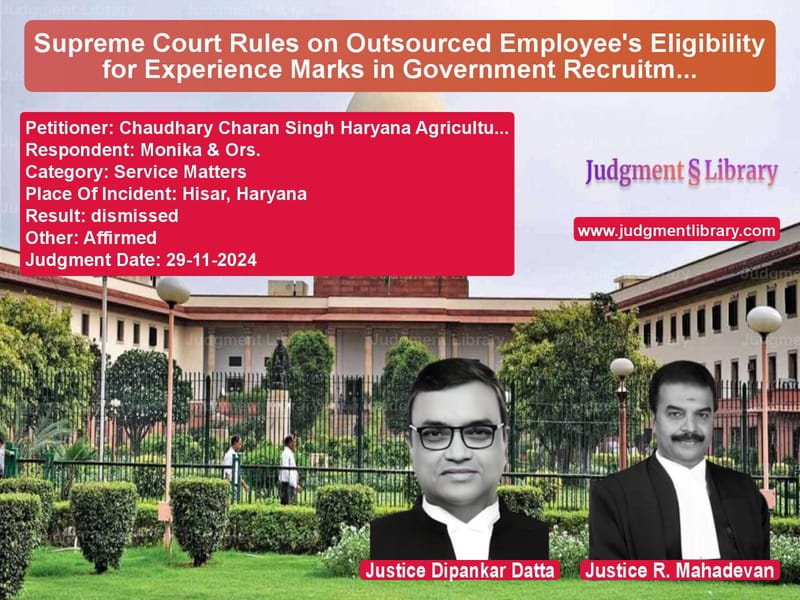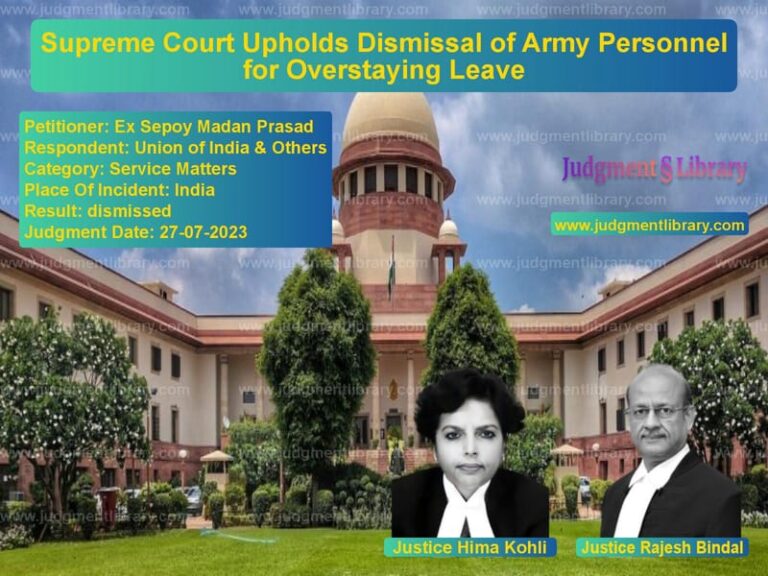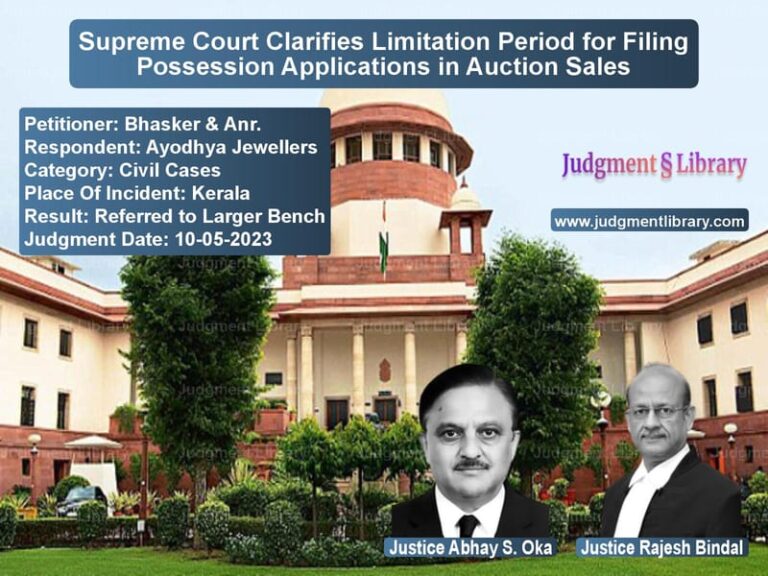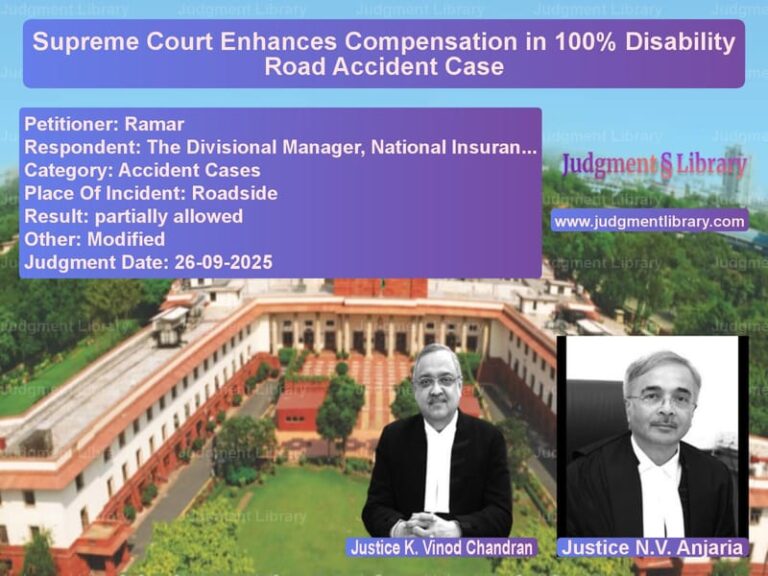Supreme Court Rules on Outsourced Employee’s Eligibility for Experience Marks in Government Recruitment
The Supreme Court of India, in a significant ruling, has clarified the eligibility of outsourced employees for experience marks in government job recruitment. The judgment in Chaudhary Charan Singh Haryana Agricultural University, Hisar & Anr. vs. Monika & Ors. addressed the contentious issue of whether experience gained by an outsourced employee could be counted for government recruitment under the relevant rules.
Background of the Case
The dispute arose when Monika, the respondent, applied for the position of Clerk at Chaudhary Charan Singh Haryana Agricultural University. She had previously worked at the university as an outsourced employee from May 5, 2017, to March 31, 2018, employed through a private contractor. Despite her experience, she was not awarded any marks under the ‘Experience’ category in the recruitment process.
The University maintained that since Monika was not engaged directly on a sanctioned post but through an outsourcing agency, her experience did not meet the criteria set by the recruitment advertisement. Consequently, her application was rejected.
Read also: https://judgmentlibrary.com/reinstatement-of-uppcl-technicians-supreme-court-overturns-termination/
Monika challenged this decision before the Punjab and Haryana High Court, arguing that her work was equivalent to that of a regular employee and that denying her experience marks was discriminatory and arbitrary.
Legal Issues Considered
- Does experience gained under outsourcing arrangements qualify for experience marks in government recruitment?
- Should an outsourced employee working in a government institution be treated similarly to directly appointed employees for the purpose of experience assessment?
- Whether the university’s recruitment process violated Articles 14, 16, and 21 of the Indian Constitution?
Arguments by the Petitioner (University)
- The University argued that the recruitment advertisement explicitly required experience in a sanctioned post within a government department.
- Monika’s engagement was through a private contractor under the Haryana Government’s outsourcing policy, and she was never officially a government employee.
- The experience certificate was issued by the private contractor and merely countersigned by a University official, making it ineligible under recruitment rules.
- Allowing experience marks for outsourced employees would open the floodgates for numerous claims, disrupting the structured hiring process.
Arguments by the Respondent (Monika)
- Monika contended that she performed the same duties as regular clerks at the university and should not be discriminated against due to the mode of engagement.
- The recruitment advertisement did not explicitly bar outsourced employees from claiming experience marks.
- The university’s reliance on technical distinctions rather than the actual nature of work was unfair and arbitrary.
- She had received a countersigned experience certificate from the university’s department, proving her actual work experience.
Supreme Court’s Analysis
1. The Meaning of ‘Post’ in Recruitment Advertisements
The Supreme Court examined whether the term ‘post’ in the recruitment advertisement implied only a sanctioned post or included contractual and outsourced roles. It ruled:
“The absence of the word ‘sanctioned’ before ‘post’ in the recruitment criteria indicates that the eligibility requirement should be interpreted broadly, considering the nature of work performed.”
2. The Nature of Work vs. Mode of Engagement
The Court emphasized that the essential factor for awarding experience marks should be the nature of work performed rather than the mode of engagement. It stated:
“A candidate who has demonstrably performed the required duties in a government department, irrespective of engagement through outsourcing, has relevant experience for recruitment purposes.”
3. Validity of the Experience Certificate
The University contended that the experience certificate was issued by a private contractor and not by the government. The Supreme Court addressed this issue, ruling:
“The fact that the certificate was countersigned by the Head of the Department of the University provides sufficient authentication of the experience claimed.”
4. Constitutional Protections and Equality in Employment
The Court examined the implications of Articles 14 and 16 (Equality before law and equal opportunity in public employment). It held:
“The exclusion of experience marks solely based on the mode of appointment, when the work performed is identical, constitutes discrimination and violates Article 14.”
Final Judgment
- The Supreme Court ruled in favor of Monika, affirming the High Court’s decision.
- The University was directed to grant her 0.5 marks for experience and reconsider her for appointment without disturbing already selected candidates.
- The ruling clarified that outsourced employees cannot be arbitrarily excluded from claiming experience marks.
Implications of the Judgment
- Equal Treatment of Outsourced Workers: The judgment ensures that outsourced employees are not unfairly disadvantaged in government recruitments.
- Clarification on Experience Marks: The decision sets a precedent that the nature of work, rather than the engagement mode, determines eligibility for experience points.
- Stricter Scrutiny of Recruitment Practices: Government institutions must ensure that recruitment advertisements are clear and do not arbitrarily exclude deserving candidates.
- Judicial Oversight on Employment Discrimination: The ruling reinforces the judiciary’s role in preventing discriminatory employment practices in public sector hiring.
Conclusion
The Supreme Court’s ruling in this case is a landmark decision reinforcing fairness and equality in government employment. By ensuring that outsourced employees receive due consideration for their experience, the judgment strengthens the fundamental principles of equal opportunity and non-discrimination in public sector hiring.
Petitioner Name: Chaudhary Charan Singh Haryana Agricultural University, Hisar & Anr..Respondent Name: Monika & Ors..Judgment By: Justice Dipankar Datta, Justice R. Mahadevan.Place Of Incident: Hisar, Haryana.Judgment Date: 29-11-2024.
Don’t miss out on the full details! Download the complete judgment in PDF format below and gain valuable insights instantly!
Download Judgment: chaudhary-charan-sin-vs-monika-&-ors.-supreme-court-of-india-judgment-dated-29-11-2024.pdf
Directly Download Judgment: Directly download this Judgment
See all petitions in Employment Disputes
See all petitions in Recruitment Policies
See all petitions in Public Sector Employees
See all petitions in Judgment by Dipankar Datta
See all petitions in Judgment by R. Mahadevan
See all petitions in dismissed
See all petitions in affirmed
See all petitions in supreme court of India judgments November 2024
See all petitions in 2024 judgments
See all posts in Service Matters Category
See all allowed petitions in Service Matters Category
See all Dismissed petitions in Service Matters Category
See all partially allowed petitions in Service Matters Category







